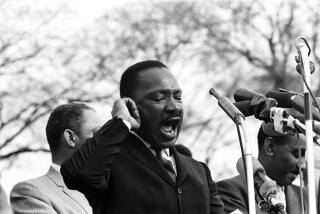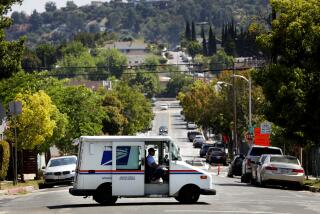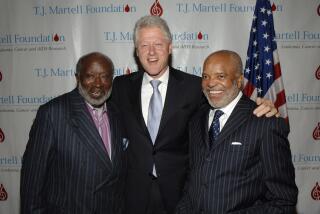Obama’s second inauguration a mark of progress in its own right
WASHINGTON — The first time Barack Obama ran, the euphoria that attended his election captivated Kamilah Aquil. Then came his presidency, a bracing reality check.
Hope faded. Not enough changed. But for Aquil, that doesn’t make Obama a disappointment.
It does make this second inauguration Monday a landmark she never expected and one she considers even more profound than the first. He’s not just the first black president, but a man Americans trusted enough, missteps and all, to give another shot at shepherding our country.
That’s one reason Aquil, a Los Angeles County probation officer, was headed for Washington last week with her 13-year-old son, Makhi Garvey.
I met them on the flight from Los Angeles, and questioned her — as I have dozens of black strangers in the last few weeks — about her verdict on Obama, who drew a record turnout of black voters in November, but less enthusiasm than in 2008.
Aquil has heard the grumbling that Obama hasn’t done enough to relieve black suffering. She doesn’t see it that way. “He puts it out on the table and tries to advocate for the country as a whole,” she said. “He can only do so much.”
Aquil was born and raised in Compton. She veered off track as a teenager, but an adult she admired steered her “off the path of destruction” and pointed her toward college.
She thinks about that when she sees her son watching President Obama. “It’s his influence, who he is as an individual,” she says, looking beyond the president’s politics to praise his patience, tenacity and balance.
For her, and for millions of African Americans whose votes kept Obama in office, this president’s reelection didn’t turn on the standard question: Are you better off today than you were four years ago?
It was tied as well to a bigger vision, a sense that their footing is more solid and their children’s future brighter because a black man — this particular black man — resides in the White House.
::
There have been reams written in the last four years about the ways race complicated the leadership challenges faced by the nation’s first black president.
Now, as Obama enters his second term, those themes are already being replayed.
Ben Jealous, head of the National Assn. for the Advancement of Colored People, is as tired of answering the question as I’ve become of asking. Has Obama delivered for the masses of black people who helped put him in office?
Jealous sighs — its meaning clear in the silence:
Isn’t it enough that the man expanded access to healthcare, dispatched Osama bin Laden and steered the nation through the worst recession in 70 years?
“I’m waiting for the article about the white president who disappointed the white people the most,” Jealous said.
“How come nobody ever asked that question: How did white people feel about Bill Clinton, about George Bush?”
Because a white president has always been perceived to be the leader of all the people.
Obama’s appraisal is muddied by uncertain expectations.
That middle-of-the-road guy we saw on the campaign trail was also fist-bumping, singing Al Green and listening to Common. Surely he would honor his roots, and black folks would have something coming.
Aquil put it more bluntly. “Some of us have issues — this sense of entitlement,” she said. “We’re always looking for the hookup. People thought, ‘We have one in office now. We’re going to get this or that.’”
Obama has collected high-profile black detractors — academics, politicians, commentators — disappointed that he hasn’t done more to tackle poverty and racial injustice.
“The president owes Black folk. BIG time,” wrote commentator Tavis Smiley in the Huffington Post.
“Other constituencies have gained ground under Obama,” Smiley told me. “But unless something significantly different is about to happen in this second term, the numbers may well indicate that black people did worse under Obama.”
“Black people have had his back,” Smiley said. But other groups seem to have his ear: Latinos on immigration reform. Women on healthcare rights. Gays and lesbians on marriage.
Those groups are following a path we trod generations ago, galvanized by Martin Luther King Jr., pounding on the door to end Jim Crow.
But the broad problems impeding black progress today — unemployment, poor education, incarceration — aren’t so focused, so fundamental, as getting permission to sit at the front of a bus or drink from a whites-only fountain.
The last 50 years of “two steps forward, one step back” have shown that we can’t undo the damage of generations of injustice simply by passing a law.
“Obama did some concrete things to make life better,” the Rev. Al Sharpton insisted. “People want him to put his fist up and say, ‘This is the black agenda.’
“He is not that kind of president … and we should not expect him to be.”
Some of the criticism is just “player hating” by blacks trying to build support for their own agendas, Sharpton said.
“The black community is not monolithic now and never has been. But people stood in line for five and seven hours to vote for this president.... We understand what we’re up against.”
Obama was hobbled in his first term by a sinking economy, Republican opposition and his own timidity. Now he owes it to the nation to do more to shrink a privilege gap. Too many blacks are stranded in an underclass that Obama can’t continue to ignore.
::
I had expected to hear that sentiment as I combed the streets talking with black people about Obama. I found plenty of disappointment — jobs lost, homes foreclosed, children stuck in failing schools — but few people willing to blame the man in the Oval Office.
Their disappointment, it seems, has been tempered by an unexpected effect: the impact on the American psyche of the image that Obama projects.
The Rev. Thomas Bowen sees it in the youth group he leads at venerable Shiloh Baptist Church in Washington, D.C.
“Before, the best these kids would hope for was to get a good government job,” he said. “Now they see their possibilities and potential as being unlimited and endless … that all they need to do is apply themselves. They can’t fall back on excuses.”
Aquil feels it. “You hear people say Obama’s not black enough. I don’t know what that means. Is that because he’s not the stereotype of the black male.... He’s not vulgar and boisterous and loud?
“He’s the epitome of the majority of the black men I’m familiar with in my life,” she said.
And that makes her proud.
And the Harris family hears it in suburban Atlanta. Dad is an IT consultant; Mom is a physician. Their son and daughter, William and Naomi, go to school with children of every race. “The are living,” their mother said, “the new normal.”
I encountered them at Ben’s Chili Bowl, the landmark joint in D.C. where Obama ate on the first weekend of his presidency. They hadn’t noticed they were seated in the booth he used, marked by the presidential seal.
Sandea Harris said she had seen a shift in attitude among her white patients. Some were once insulted by the mere idea of a black man from the South Side of Chicago aiming to be president.
Now, she said, “patients come to me and say, ‘I don’t agree with him on everything, but he’s really changed my mind.... I’ve listened to him speak.’”
“They had to get around the packaging,” said her husband, Willie. “Obama has taken them outside of what they were raised to believe.”
That’s harder to quantify than legislative gains: the shifting attitudes among whites, the sense of belonging among blacks. But it’s just as real, and maybe just as important.
“He’s moved the needle,” Willie Harris says. And it’s hard to put into words the thrill they feel, seeing a “real family” like theirs in the White House, “instead of what is marketed as a traditional American family.”
That’s what is drawing their family and Aquil and me to the National Mall for the replay Monday of a moment we never expected to see.
The crowd will be smaller this time, the parties not so grand.
One hundred and fifty years after slavery ended, Obama again will take the oath of office, with his hand on two Bibles — one used by Abraham Lincoln, the other belonging to King.
It’s a ritual rendered ordinary; we’ve been through this before. It’s no longer historic, they tell us. And maybe that’s the point.
More to Read
Start your day right
Sign up for Essential California for news, features and recommendations from the L.A. Times and beyond in your inbox six days a week.
You may occasionally receive promotional content from the Los Angeles Times.






